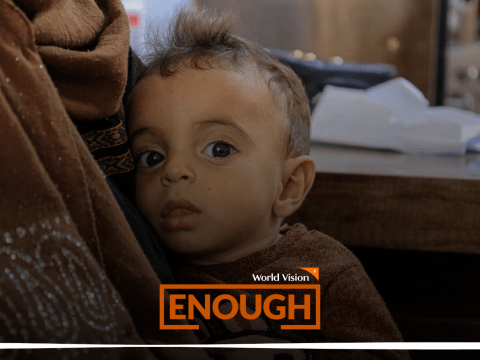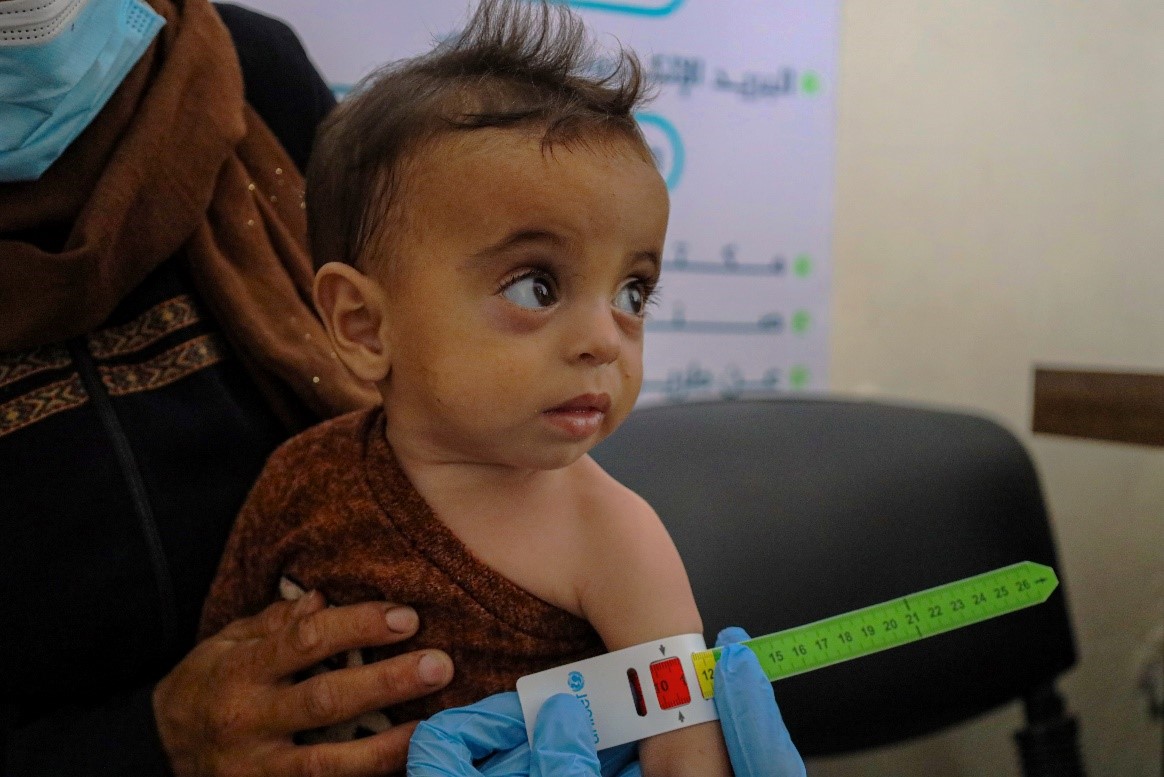No loud words, just reality

HUNGER CRISIS, FOOD INSECURITY, MALNOUISHEMENT, SEVERE ACUTE MALNUTRITION, CHILD STUNTING, MATERNAL MANLUTRMENT.
World Vision Syria Response does not employ load words for the sake of using them. They describe a steadily deteriorating situation and a dire reality in Syria. As the conflict in Syria marked more than 13 years, the Syrian population reached an alarming situation waiting for a humanitarian catastrophe to fully unveil itself. As of 2024, half of the population lives in severe poverty incapable of securing the most basic needs including food. This leaves them vulnerable to malnutrition, especially women and children.
Unfortunately, the domino effect is prevailing around Syria as malnutrition rates are spiking up across the country. Child stunting occupies children’s bodies preventing a healthy childhood and later adulthood for generations to come. These are not isolated indicants as women are also caught in a vortex of hunger unable to sustain their children or future pregnancies.
Sadly, 2,000 pregnant women need urgent care as expressed by UNFPA. In addition to almost 1,500 other expecting mothers giving birth under inhuman conditions. The truth is their hardship is inflected by years of conflict, displacement and lack of access to healthy food and medical care.
One of these mothers whose story embodies the wrath of Syria’s current reality is 29-year-old Aman*. Upon marriage, Aman envisioned a comfortable and flourishing life, but the ongoing situation forced other plans. “Six years ago, my husband and I dreamed about building our life, a better one for our family through farming and livestock”. At that time, Aman had one child, and he was four years old. Life was simple, it wasn’t easy, but it was a simpler version and food wasn’t a rarity. She could feed her child, and at that time she couldn’t ask for more than that.
Fast-forward to a couple of months, similar to hundreds of thousands of families, they had to leave. That choice did not come lightly to Aman and her husband, but it was necessary to live another day. “Here we are now, cast aside on a barren mountain, where only wild animals live. We managed to secure a temporary shelter in a caravan, but it offered little comfort. In winter, it's flooded, and in summer, it's a sweltering oven. Our existence feels like a prolonged death," Aman felt like she was escaping her lurking destiny.
While life of displacement seemed like a dead end at every turn, she was blessed with three other children. The loving mother knew she had to persevere for her children’s sake “perhaps most mothers feel happy when they are blessed with a new child because it brings happiness to the hearts of their families and restores their passion for life, but we in the camps live a different reality,” she shares her joy mixed with bitter emotions. However, lack of food was visible on both the dinner table and on Aman’s body. Day after day, she would prioritise feeding her children instead of eating herself leading to her body becoming frailer. The weight began falling off of Aman’s body similar to leaves falling off a tree before entering winter. However, nothing matched her love for her children and seeing them eat was a blessing she was grateful for.
This reality cast a shadow of helplessness on mothers like Aman* who has been in survival mode for the past 13 years. “Every day we find ourselves in a relentless fight for survival. We leave no stone unturned; our goal is not to be rich but perhaps one day we find a morsel of bread quelling our children’s hunger”, she shares.
Each day, Aman lived like it was her last, her existence overshadowed by poverty and inability to feed her children. Her family’s dire situation was worsened by the “unprecedented funding crisis” supporting 3 million people like her, whose main source of income and food, is humanitarian aid. Aman recalls that period saying ,“we did not even have a piece of bread. I suffered from malnutrition due to poverty and my body became so weak, I lost hope and will for life”.
A while later, she received the joyful news that she was pregnant with her fifth baby, Samer*. However, this pregnancy was different, Aman struggled to find food to sustain her body and so did 200,000 other pregnant women. As she faced a persistent lack of food, her body grew weaker and her baby grew stronger deriving the needed nutrients from her body leading to her suffering from malnutrition. “I became a shadow of myself and I wondered how my child would survive, we endured almost two years of neglect and lack of humanitarian aid,” she recalls.
So, her heart was shattered when she learned the dreaded news any mother would hear upon childbirth, your child isn’t healthy. “Samer, my son, was born with malnutrition, as I knew he would be. His cries day and night are a constant reminder of our suffering,” she shares.
Samer’s cries are a reminder of the reality that was forced on Aman six years ago, the aftermath of the conflict, the forced decision to leave that day and lack of food occupying Syria’s land. “He and I were trapped in the same cycle, the same fate at some point. I tried to eat anything to sustain him after the birth, but it didn’t work, my milk disappeared because of malnourishment,” she explains. Aman continues, “despite my attempts to breastfeed, my empty body could offer him no nourishment, I would consume anything edible, hoping to provide him with meager sustenance, but my milk supply dwindled”. During this time, Aman’s mind kept racing almost going out of control, she was trying to elevate the sorrow she felt as a mother after seeing her baby unable to feed properly. However, the sad reality, due to the severe malnutrition Aman suffers from, her body is in survival mode as it tries to keep itself alive treating milk production as a second priority.
As a result, the worried mother carried her distressed baby and headed to the nearest medical health centre. Aman would see some people wearing certain branded vests with logos around the displacement camps providing services and upon asking, she found out that these people were the Rapid Response Teams part of the Nutrition Project which aims to provide medical care and support for nutrition-related issues. She later learned that the medical centre was also implemented under the same project, providing her with more relief.
As soon as she entered the centre, her baby was admitted to the malnutrition clinic, and subsequently provided with the needed supplements to alleviate his situation. Now, Samer is on his way to recovery, “with the nutrition team’s help my baby can recover,” the mother prays.
Moreover, Aman was also enrolled in the mental and psychological support program-Thinking Healthy Program, after she was displaying Postpartum Depression symptoms. Unfortunately, Aman has lived through unfathomable hardship and despair throughout her life, she reached a point where hope seemed unattainable. But with the specialised care under this project, that darkness that’s been weighing down on her shoulders began slowly lifting. Her diligence in attending the five sessions led Aman to create her own space with the facilitator, thus unearthing built-up emotions and traumas.
Aman began seeing the light at the end of what seemed like a very dark tunnel when she saw her little baby recover and begin to take care of herself. Aman ends, "thank God I knew about your teams' services. My initial goal was to seek medical care for my malnourished baby, but the mental health support team revitalised my spirit. Negative thoughts vanished, and I regained a sense of hope. Now, I'm determined to persevere. I'm resolved to build a better future for our family. Surrendering to despair would be a waste of life. I'm eager to embrace life's possibilities and create a brighter future for my children. Thank you for your invaluable support. I hope such initiatives continue; they're as essential to us as food and water".
Such projects are invaluable for internally displaced people and who have been affected by the earthquake. For Aman thanks to her perseverance, the support of this project and staff, she was able to regain hope and secure treatment for her malnourished baby and so did more than 40,000 others. The project includes nutritional screening for the early detection of malnutrition cases, where we provide consultations on appropriate infant and young child feeding (IYCF) practices provided by 56 nutrition-trained staff.
The health and nutrition project also provides a special focus on treating malnutrition through two outpatient therapeutic clinics (OTP) and two mother and child nutrition clinics (MBC), in addition to referring critical cases, children were so far supported under this project. Also, activities such as food meal distribution (FMA), distribution of infant and young child feeding kits (IYCF Kits), and cash transfer activity (CVA) to support families in need.
The health education programs include awareness sessions on the importance of vaccination, hygiene, and cholera prevention, to promote preventive behaviours within the community, so far 10,852 people benefitted from these services. The project aims to improve the health and nutritional status of children and women and support the community in addressing health challenges.

*Name has been changed to protect identity.
